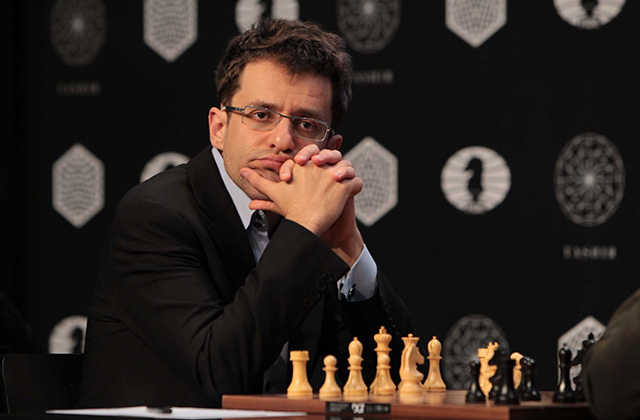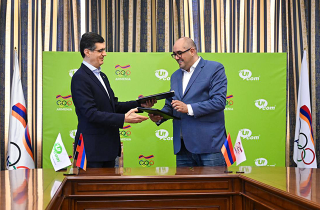A chess master with an unpredictable style and the hopes of a nation. The New Yorker

Newyorker.com wrote: In 1988, war broke out between Armenia and its Soviet Republic neighbor of Azerbaijan, over the long-disputed Nagorno-Karabakh region. It was another tragedy in a century of tragedies for Armenia, going back to the genocide carried out by the Ottoman Empire against the Armenian people, beginning in 1915. When the 1988 war began, thousands of ethnic Armenians who lived in Azerbaijan fled their homes. One of them was Melikset Khachiyan, a chess player who studied the game, as a teen-ager, under Tigran Petrosian, Armenia’s greatest-ever player. Khachiyan had shown early promise, but a shot at the game’s highest level, in an era of legends like Kasparov, Karpov, and Tal, eluded him. Now he needed a place to stay. He headed to Yerevan, Armenia’s pretty, pink-stoned capital; there, Grigory and Seda Aronian offered him a room in their modest home on the edge of town. Rather than pay rent, they suggested, he could teach their six-year-old son, Levon, chess.
Three years later, shortly after the Soviet Union collapsed and Armenia became an independent nation, Levon Aronian, under Khachiyan’s tutelage, quit school to focus on chess full time. Now thirty-four, Aronian is ranked seventh in the world and has one of the highest ratings in chess history. Armenia, a nation of three million people, is the game’s perennial overachiever. Per capita, more players from Armenia have attained the coveted status of grandmaster than any other country, and Armenia has won men’s gold at three of the last six Chess Olympiads, the highest honor for a national team. Armenia’s President is also the head of the country’s chess association, and he has spearheaded a chess revolution: Armenia is now the only country where the game is a required part of the national curriculum, and its top players receive a state stipend. “For a small, landlocked country, chess is a particularly ingenious way, and effective way, of mobilizing both competitive spirit and sports competition and intellectual discipline, without the need for huge infrastructural resources and, of course, financial spending,” the Armenian-American writer Peter Balakian told me recently.
Aronian has won dozens of tournaments and global admiration, and he has become a bona-fide star in his native country—but he has yet to win chess’s greatest prize, the World Championship. He grew up, he told me, surrounded by reminders of the time “when your country used to be a strong country.” And the longer he shoulders the hopes of a nation desperate for homegrown success, the tougher it is becoming, it seems, to fulfill his immense potential.
I first saw Aronian play in 2015, at a “blitz,” a high-speed chess event in Berlin. Most leading chess players appear tightly wound at the board; Aronian looks like he’s waiting for an Old-Fashioned. Last summer, we met at a swanky new hotel in downtown Yerevan. As we ate lunch, people stared and took selfies. Aronian is raffish and charming, with unkempt hair and louder clothes than his chess-playing peers tend to favor. His chess skills were a route out of poverty. In the years following independence, blockades with Turkey and Azerbaijan, which still hold today, killed trade. Blackouts were common then; Aronian and Khachiyan would often practice by candlelight, up to six hours a day. Aronian loved the concept of sacrifice, and the idea that he could do anything so long as he achieved one goal: kill the king. He went out little, forfeiting friendships and the trappings of boyhood.
Aronian and Khachiyan began walking an hour and a half to play at chess clubs in Yerevan. Soon Aronian was winning tournaments, and making money on the side by beating businessmen in hotel lobbies. Small-time sponsors came and went; an airmail firm put in some cash—at one point, Aronian even travelled abroad with the mail. By the time he was thirteen, he was making enough to support his family. They needed the money, and Aronian turned that desperation into a strength, playing aggressively and unconventionally against his studious, better-dressed opponents. “I had to kick their ass,” Aronian told me. He added, “They look in your eyes and they understand that you are a barbarian, and the kids generally fear the ones who are savages.” He paused as we spoke to prevent a waitress from taking some half-finished plates. “There is still the barbarian in me—I won’t let my food be taken away.”
Aronian reached the level of grandmaster in 2000, when he was seventeen, but the Armenian Chess Federation repeatedly overlooked him in favor of older, more established players. After the A.C.F. froze him out of a tournament in India, his mother decided she had seen enough and uprooted the family to Berlin. Suddenly the Aronians were members of the seven million-strong spyurk (“spread”), the Armenian diaspora created mostly by the 1915 genocide. Unencumbered by Armenia’s infighting and isolation, Aronian flourished. He played over a hundred matches in his first year in Germany. In 2002, he won the Armenian Chess Championship and became World Junior Champion. He is now a rich man.
In 1963, when Petrosian took on the Russian Mikhail Botvinnik for the World Championship, thousands camped out in Yerevan, watching each move relayed via telegraph to a giant demonstration board in the city’s Opera Square. Petrosian’s victory caused a “chess boom” in the country, Mikayel Andriasyan, the secretary-general of the A.C.F., told me. In recent years, when Armenia has won the Chess Olympiad, there have been similar celebrations. (Armenia did not compete at last year’s Olympiad, because it was staged in the Azerbaijani capital city, Baku: the Nagorno-Karabakh conflict remains unresolved.) Aronian played a key role in all of those victories: in 2004, Serzh Sargsyan, a former government defense minister, became the chief of the A.C.F., and he coaxed Aronian, who had climbed into the top hundred of the world rankings, back to the national team. (Four years later, Sargsyan was elected President of Armenia.)
By 2005, Aronian was ranked fifth in the world and became a national hero in Armenia. Stardom is a great honor, Aronian told me, but it’s double-edged. “Some people are cheering you up, while some people who are generally unhappy, they’re sharing their unhappiness,” he said. (Taxi drivers, he added, are particularly blunt with their criticism.) Aronian splits his time between Berlin and Yerevan, where he lives with his fiancée, Arianne Caoili, who has represented both the Philippines and Australia in the Women’s Chess Olympiad and also works as a consultant. Aronian has a small circle of friends and rarely goes out alone. Most days he listens to classical composers—“Bach for his spirituality and passion, Bruckner for his structure, Schubert for his serenity and firm structures, Mahler for the ways he goes from small to grandiose, Shostakovich for the gentle darkness”—and practices chess moves for hours. He still wears his emotions on his sleeve. He often loses chasing improbable wins when he should settle for a draw. And he takes losses badly, blaming anything from the venue to the general public. After a poor performance at a tournament in Sharjah, in the United Arab Emirates, in February, he told me that he lost because he was “not in the mood.”
“For me, Levon is more someone who needs things to flow,” the five-time world champion Vishy Anand told me. Wesley So, a Filipino-born U.S. player ranked second in the world, told me over e-mail that, when playing Aronian, “you never know if any move is straightforward and it’s best to assume it isn’t.” His swashbuckling manner recalls eccentric former greats like Bobby Fischer and Kasparov, and contrasts with the game’s contemporary masters, quiet geniuses who play with quantum precision. “You’re free to express yourself in the game of chess,” Aronian told me, comparing it to his beloved classical music. “You can play anything as long as you are determined to fight for the ideas you put in your moves.”
Read full article here.

























